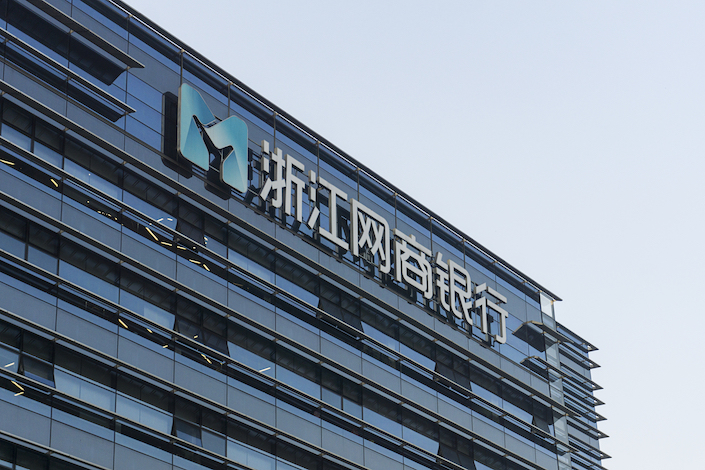Alibaba-Backed MYbank to Offer Nearly $700 Million of Perpetual Bonds

Alibaba-backed online lender MYbank became the first private lender to win approval to replenish capital through the sale of perpetual bonds as regulators take more steps to ease smaller banks’ thirst for capital.
Officially known as Zhejiang E-Commerce Bank Co. Ltd., MYbank won approval to sell as much as 5 billion yuan ($698.1 million) of perpetual bonds to supplement its Tier 1 capital, according to a statement published by the China Banking and Insurance Regulatory Commission.
Perpetual bonds are a type of debt with no fixed repayment date. Issuers can either pay interest indefinitely or until they choose to pay back the debt. Accounting regulations allow perpetual bonds to be treated as equity rather than liabilities on balance sheets.
Zhejiang-based MYbank joins a series of Chinese lenders issuing perpetual bonds after regulators stepped up support for banks to recapitalize through bond sales since last year amid the economic slowdown. It was the first privately funded bank to win such approval.
A private bank executive said the approval for MYbank sent a clear signal that private banks will be able to tap perpetual bond sales. Local regulators were hesitant to allow them to do so amid the lack of a clearly defined policy. The executive said he expects more private banks to apply for the bond sales.
Founded in 2015, MYbank is an internet-only lender majority-owned by e-commerce giant Alibaba Group Holdings. After a late 2019 equity sale, Alibaba owns 30% of the bank, followed by agricultural services provider Wanxiang Sannong Group Co. Ltd. and Ningbo Jinrun Assets Management Co.
MYbank expanded its registered capital from 4 billion yuan to 6.6 billion yuan after the investment. President Jin Xiaolong said in March the capital injection helped MYbank to cope with business changes during the Covid-19 pandemic but the company would need more funding to support future growth.
Dong Ximiao, chief analyst at Zhongguancun Internet Finance Institute, said private banks in general face capital constraints to back rapid business expansion since they started to emerge in China a couple of years ago. However, many private lenders have encountered limits on replenishing capital using bond and equity sales because of regulatory restrictions such as a requirement of three years of profitability for corporate bond sales, Dong said.
Top financial regulators have pledged to help small and medium-sized lenders to replenish capital. A State Council body overseeing the finance industry Wednesday issued guidelines including plans to further expand smaller banks’ funding channels.
Wang Gang, a researcher at the Development Research Center of the State Council, a think tank, said perpetual bonds are a preferred option for small and medium-sized, nonpublicly traded banks to raise capital because of their lower cost and flexibility. Wang estimated that there will be potential demand for 374.5 billion yuan of perpetual bond sales by city commercial banks, rural banks and private banks in China.
Several small city banks have recently issued perpetual bonds. That includes 2.2 billion yuan sold by Bank of Dongguan, 1.2 billion yuan by Bank of Huzhou and 3 billion yuan by Guangxi Beibu Gulf Bank.
This story has been updated to fix an incorrect yuan-to-dollar conversion in the story and in the headline. The correct number is $698.1 million.
Contact reporter Han Wei (weihan@caixin.com) and editor Bob Simison (bobsimison@caixin.com)
Caixin Global has launched Caixin CEIC Mobile, the mobile-only version of its world-class macroeconomic data platform.
If you’re using the Caixin app, please click here. If you haven’t downloaded the app, please click here.





